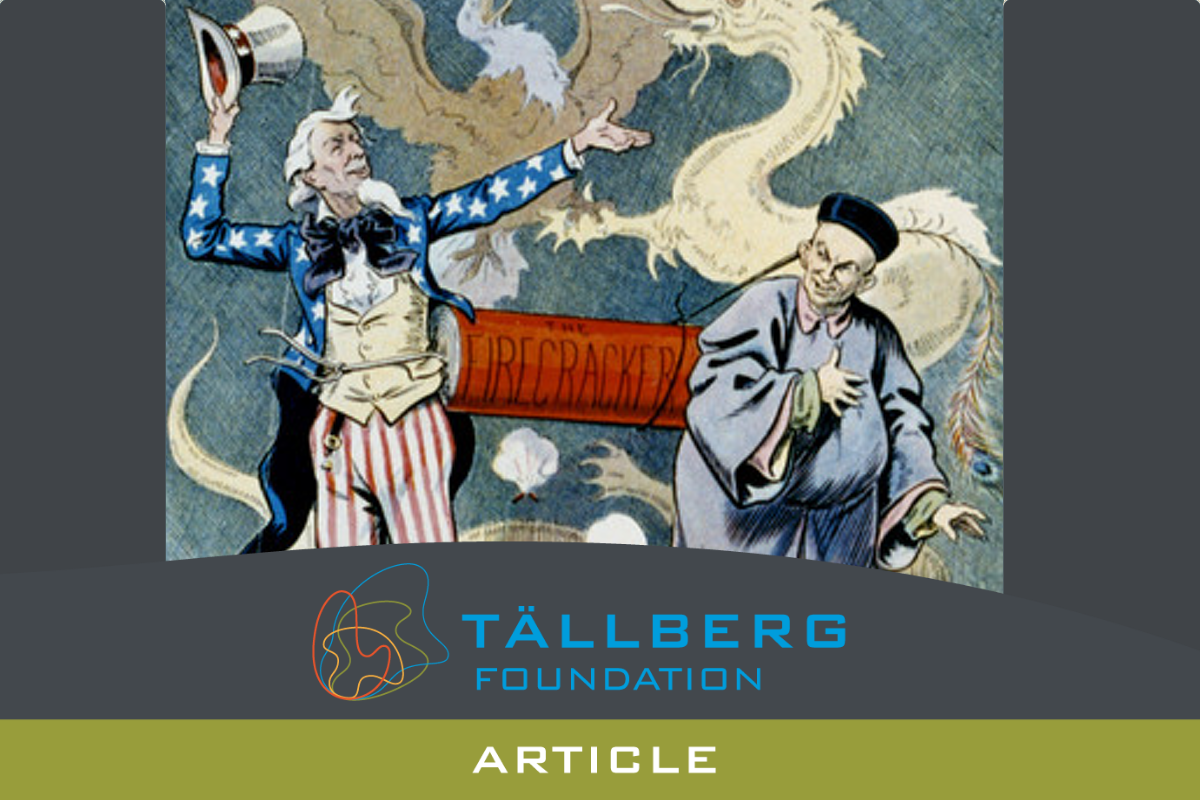“If China can rise smoothly to the top of the world without firing a single bullet, it will certainly be able to claim the moral high ground. This may sound harsh, but the truth is that peace is not a godsend. It often has to be earned, sometimes at the cost of war.”
China Daily, 2017—as quoted by Jonathan Ward
What does China or, at least, President Xi Jinping and the Chinese Communist Party (CCP) really want? Some argue they simply want respect. Others say a well-deserved place at the table, consistent with their size and economic strength. Still others insist that the goal is “Asia for the Asians” which translates into pushing the United States out of the Western Pacific. Jonathan Ward, a young American China expert who is clearly on a rising trajectory, has a bigger answer to the question: “Supremacy.”
Ward thinks that what started as an effort to “restore China’s position in the world to one in which they could contend with other major empires, other major powers” has evolved to the point where the CCP wants “supremacy in an international system…that returns to a sense of an earlier imperial worldview, where China sat at the head of the known world…In today’s global world, of course, that would mean China at the top of an international system that is fully global and their power has expanded worldwide, chiefly through economics and international influence. But they’re also building a military that’s designed to secure their expanding power initially in their region, ultimately around significant places in the globe.”
The counterpoint is that China’s leaders talk about “national rejuvenation” and a world where “One or a few countries shouldn’t impose their rules on others…bossing others around” as President Xi Jinping recently declared. But Ward thinks this is code for something else: a world where the Chinese believe “They are meant to be the dominant power and that the world is sort of essentially set right when China has no true equal.”
Ward says that China’s strategy inevitably leads with economics: on the one hand, a relentless drive to grow faster and to dominate critical technologies and, on the other, a global trading and investment effort that reorients the global economy towards China. “The underlying strategy is to become the dominant feature of a globalized economy, the center of supply chains, an enormous market that basically brings all manner of nations and industries to their door. To be second to none in terms of technology and military power. To secure, as they see it, their overseas interests that really are far beyond East Asia…an intercontinental strategic geography.”
If Ward is right, the obvious question is whether that would be good or bad for a world that is struggling with a pandemic, recession, and social stresses. Chinese leaders have obviously figured out how to supercharge their economy and to develop new technologies at a stunning pace; for example, they tamed COVID faster than most others (even if their initial failures helped to provoke the global pandemic). And, since they insist that they don’t care how other countries manage their own internal affairs, could a ‘Pax Chinois’ actually be the “win-win” that is the bread and butter of Chinese speech making?
Ward’s not buying it for a second. First, he insists that, if China ends up on top, “we would exist in a world of systemic repression that may be very similar to what’s taking place inside their own country…a world that, in many ways, is conceived in the image of the Communist Party, in which there isn’t really dissent. They have obviously expanded their ability to coerce and sort of control their own population. They’ve enacted a massive surveillance state. They’re carrying out a genocide of the Uighurs using all manner of repressive techniques and processes.”
Moreover, the idea that they don’t want to interfere in other countries’ internal affairs “is one of their catchphrases…But, at the same time, they absolutely want to shape the way that our CEOs talk and think. They want to shape the way that we look at them…Just at the end of last year, Beijing released a list of the 14 sins of Australia, essentially saying, ‘Here are the ways that we think Australia needs to conduct itself.’”
Part of the problem is that the Chinese have a strategy—they know where they are going and how they want to get there—and the West does not. “This is part of a long-term vision and series of strategies that at the end of which they [the Chinese] see themselves as dominating not only the Indo-Pacific, but ultimately being the unrivaled nation in the world.”
The Chinese leadership’s strategy has been based on an assumption that the world would accept China’s rise. They believed “that their integration into the global economy [and] peace in general would contribute to their economic development and ultimately to their…comprehensive national power.” As time passed, they came to “believe their own narrative that they are in sort of inevitable ascendancy and that the U.S. and the West (more broadly) are in terminal decline.”
Ward, not surprisingly, does not accept that conclusion. So, what should the United States and its allies do? His prescriptions:
- “The United States will have to remain the world’s top economy, will have to unite the world’s democracies in a diplomacy that can counter China at every turn as needed. And…maintain defense and deterrence in the Pacific.”
- “Integrate Asia, Europe, North America into an alliance-based trading system so that our economies can prosper, even as we have to take harsher measures against China on human rights grounds, security grounds, and otherwise.”
- Recognize that a “new American industrial policy is going to be essential. Coordinate industrial policy with other free countries in Europe, in Asia, in India…Rebuild a new form of globalization that is built on the world’s democracies…away…from Russia, China, and Iran.”
Ward’s proposal amounts to a profoundly radical transformation of American economic and foreign policy strategy; it implies a deeply different definition of globalization—a fundamental shift from a vision of a globalized economy based on economics to a regionalized economy based on politics. He agrees: “I think we have to understand there’s a natural decoupling that’s going to happen because the other major economic update…is the Internet of things and the digitization of all kinds of machinery, processes, and consumer appliances—you name it. And at the end of the day, our two operating systems just won’t be compatible.”
That has huge, practical consequences: “You wind up in a bifurcated world. So it’s better for us to be investing now in what that bifurcation looks like.”
Ward would be confident the outcome is good for the West and bad for China. “Ultimately [we will] leave them behind economically, defund their military capabilities and essentially prevent their ambitions from coming to fruition.”
The obvious, unasked question: is “ultimately” soon enough to matter?
Let us know what YOU think and leave your comment below.
Jonathan Ward recently spoke with Alan Stoga as part of the Tällberg Foundation’s “New Thinking for a New World” podcast series. Hear their whole conversation here or find us on a podcast platform of your choice (Apple Podcast, Spotify, Acast, Stitcher, Libsyn, etc).
ABOUT OUR GUEST
 Dr. Jonathan D. T. Ward is an internationally recognized expert on Chinese global strategy and US-China competition. He earned his PhD in China-India relations at the University of Oxford and his undergraduate degree at Columbia University where he studied Russian and Chinese language.
Dr. Jonathan D. T. Ward is an internationally recognized expert on Chinese global strategy and US-China competition. He earned his PhD in China-India relations at the University of Oxford and his undergraduate degree at Columbia University where he studied Russian and Chinese language.
Dr. Ward’s experience in Asia includes traveling across Tibet in truck caravans, crossing the South China Sea by cargo ship, and gaining access to Communist Party diplomatic archives in Beijing which have now been closed to the world. Dr. Ward lived and traveled globally for over a decade in China, India, Russia, Latin America, Europe, and the Middle East. He speaks Chinese, Russian, Spanish, and Arabic.
He has consulted for the U.S. Department of Defense on Chinese long-term strategy and for leading Fortune 500 corporations on US-China global competition. Dr. Ward has briefed leading American companies in the defense, aerospace, technology, financial services, telecommunications, automotive, and industrial sectors on Chinese strategy and US-China competition. He is a frequently invited speaker for government, military, industry, and financial audiences.





What are some of the most pressing issues or challenges in US-China relations that you think need more attention in global policy discussions? Regard IT Telkom